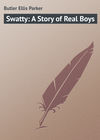Kitabı oku: «The Jack-Knife Man», sayfa 3
“Stay on her as long as you like,” said Rapp. “You can live right in her all winter. All I want is to get her down to my place right away before the river closes, so she’ll be there when the ducks fly next spring.”
“Now, that’s another thing,” said Peter uneasily. “With all the preparations I have to make for my trip I’ll have to be round town more or less this winter, and as your place is a long way down river, I thought maybe you might let the boat stay where she is this winter, George?”
“You can sleep in my barn any time you want to, Peter,” said Rapp. “I might as well let that boat lie where she is forever as leave her there all winter. I want her down there when the ducks fly north. I’ll give you five dollars extra for floating her down, and a dollar or so a week for taking care of her, but if she can’t go down she ain’t any use to me.”
“The way the ice is beginning to run I’d have to start her down to-day or to-morrow,” said Peter regretfully. “It upsets my plans, but I got to have some ready cash. If the wind shifts your slough will be ice-blocked, and there ain’t no other safe place to winter a boat down there.”
“You don’t have to sell her if you don’t want to,” said Rapp. “You can put off your trip. Seems like I’ve heard you put off trips before now, Peter.”
“Well, I guess I’ll sell, George,” said Peter. “Maybe I can trap muskrats or something down there, I’ll make out some how.”
He took the money Rapp handed him and once more Peter was homeless. He was no better than a tramp now. His plans were vague as to the sick woman, but forty-five dollars seemed a great deal of money to Peter. He might hire a room from Mrs. Potter, if that lady would permit, and have the sick woman cared for there, or he might, have her brought to town and lodged somewhere, if any one would take her in. There was no hospital in Riverbank. But he was happy. Somehow, he did not doubt he could care for the woman, for he had money in his pocket. To turn her over to the county poor-farm did not enter his mind. He would not have given a dog that fate.
He drove to Main Street first and tied his horse before the grocery that received his infrequent patronage. Here he bought a bag of flour and six packages of roasted coffee, some bacon and beans, condensed milk and canned goods, sugar and other necessities, and then let his eyes wander over the grocer’s shelves. He had about decided to buy a can of green gage plums, as a dainty he loved and never indulged in, and therefore suitable to buy for the sick woman, when he saw the small white jars of beef extract, and he bought one for the sick woman.
While his parcels were being wrapped he picked up the copy of the Riverbank News that lay on the counter and glanced over it, for a newspaper was a rare treat for Peter. On the first page his eye caught the headline “Pass Her Along.” It was at the head of an article in the News reporter’s best humorous style, and told how Lize Merdin, a notorious character, had been run out of Derlingport, the next town up the river, and ordered never to return under pain of tar and feathers. “The gay girl hit the ties in the direction of Riverbank at a Maud S. pace, yanking her young male offspring after her by the arm,” wrote the reporter, “and when last seen seemed intending to favor River-bank with her society, but up to last reports nothing has been seen of her there. It is a two days’ jaunt for a gentle creature like Lize, but when she hits the River Street depot she will find Riverbank a regular springboard, and the bounce she will get here will impress on her receptive mind the fact that Riverbank is not hankering for her company. Pass her along!”
Peter folded the paper and laid it on the counter. So that was who his visitor was, and how she came to be tramping the railway track! He walked to where great golden oranges glowed in a box, near the door, and chose half a dozen and laid them beside his other purchases. These too were for the sick woman. Then he selected a dozen big, red apples and laid them beside the oranges. They were for Buddy. It was Peter’s method of showing his disapproval of the bad taste of the News’’ article.
When Peter reached the widow’s farmhouse the doctor’s horse still stood in the bam-yard, and Peter put up his own horse, while waiting for the doctor to come out.
“How is the widow? Is she bad off?” he asked when the doctor appeared.
“Mrs. Potter thinks she is a very sick woman, and she isn’t a well one,” said the doctor. “She’ll stay in bed a week, anyway. That’s some woman. She has Mrs. Skinner hopping around like a toad in a skillet already, and she sent orders by me that you are to come and sleep in the kitchen, to be handy if she has a relapse in the night. You are to take care of her stock, and saw the rest of her cord wood, and do the odd chores, and if the pump freezes thaw it out, before it gets frozen any worse.”
“Now, ain’t that too bad!” said Peter. “Just when I’ve got to get started down river this afternoon. Things always happen like that, don’t they?”
He led the way across the frozen corn-field to his shanty-boat, and opened the door. Buddy had managed to turn the table upside down and was “riding a boat” in it. The doctor gave the boy and the cabin one glance and had Peter classed as one of the shiftless shanty-boatmen before he had pulled off his fur gloves. Then he turned to the woman. She was lying with her face toward the wall. He bent over her, and when he straightened his back and turned to Peter his face was very serious.
“Your wife is dead,” he said.
Peter’s pale blue eyes stared at the doctor vacantly.
“Dead?” he stammered. “My wife? Why, doctor, she ain’t – ”
“Yes,” said the doctor, not waiting to hear the conclusion of Peter’s sentence. “She has been dead an hour, at least. A weak heart, overtaxed, I should say. What do you mean by leaving her in these damp clothes? I should have been called long ago.”
“Now, ain’t that too bad! Ain’t that too bad!” said Peter regretfully. “It ain’t nobody’s fault but mine. I ought to have gone for you last night, and there I was, a-sleepin’ away as comfortable as could be!”
“She should have been under treatment for some time,” said the doctor severely. He was a young doctor, and important, and not inclined to spare the feelings of a mere shanty-boatman. Here he could be severe, who had to be suave and politic with better people. He told Peter brutally that the woman had not been properly cared for; that with her constitution, she should have had delicacies and comforts and kindness. “If you want my candid opinion, you as much as killed her,” said Dr. Roth.
He was nettled by Peter’s apparent heartlessness, for while Peter showed that the death had shocked him, he gave way to no outburst of sorrow such as might be expected from a bereaved husband. But now deep regret in Peter’s eyes touched him.
“I shouldn’t have said that,” he said more kindly. “I might not have been able to do anything. Probably not much after all. But if you don’t want the boy to go the same way, treat him better. You have him left.”
Peter turned and looked at Buddy who, all unconscious, was rowing his table boat with a piece of driftwood for oar.
“That’s so, aint it?” said Peter. “She’s left the boy on my hands, ain’t she? I guess I got to take care of him. Yep, I guess I have!”
When the doctor left the boat, half an hour later, he shook his head as he closed the door.
“Shiftless and unfeeling!” he muttered to himself. “‘Left the boy on my hands!’ Poor boy, I’m sorry for you, with a father like that.”
For he did not see Peter drop on his knees beside the curly headed child as soon as the door was closed, and he did not see how Peter took the boy in his arms. He could not hear what Peter said.
“Buddy boy,” said Peter, “how’d it be if you and Uncle Peter just sort of snuggled up close and – and et a big, red apple?”
V. BUDDY STEERS THE BOAT
NOW, don’t you fret, Buddy-boy,” said Peter Lane with forced cheerfulness, “because I’m going to let you do something you never did before, and that I wouldn’t let many boys do. You are going to help Uncle Peter steer this boat, just like you was a big man.”
Buddy stood in the skiff which was drawn up on the bank. Peter, with a rock and his stove-poker, was undoing the frozen knot that held his shanty-boat to the Rock Island Railway System, and by means of that to the State of Iowa. He was preparing to take the shanty-boat down the river to George Rapp’s place. His provisions were aboard, the rag of a sail lay ready to raise should the wind serve – but it promised not to – and the long sweep that had reposed on the roof of the boat was on its pin at the bow, if a boat, both ends of which were identical, could be said to have a bow.
“I like to steer boats,” said Buddy out of his boyish optimism.
“I bet you do,” said Peter, “and a mighty good steerer you’ll make. I don’t know how Uncle Peter could get down river if he didn’t have somebody to steer for him. Now, you let me push that skiff into the water, and we’ll row around the boat, and before you know it you’ll be steering like a regular little sailor.”
He threw the mooring rope on to the stern deck of the shanty-boat, pushed the skiff into the water and poled to the other end of the boat where the long sweep was held with its blade suspended in the air, the handle caught under a cleat on the deck. Peter lifted Buddy to the deck, made the skiff’s painter fast, and climbed to the deck after the boy.
“Now, Buddy, we’ll be off in a minute and a half,” he said, “just as soon as I fix you the way they fix sailors when they steer a ship in a big storm.”
He drew a ball of seine twine from his pocket, knotted one end about Buddy’s waist, cut off a generous length, and tied the other end to the cleat.
“Don’t!” said Buddy imperatively. “I don’t want to be tied, Uncle Peter.”
“Oh, yes, you do!” said Peter. “Why, a sailor-man couldn’t think of steering a great boat like this unless he was tied to it.”
“No!” shouted Buddy, and Peter stood, holding his end of the cord, studying the boy.
“Now, Buddy-boy,” he said appealingly. “Don’t holler like that. Ain’t I told you we must keep right quiet, because your ma is asleep in there.”
“But I don’t want to be tied!” cried the boy.
“But Uncle Peter’s going to be tied, too,” said Peter. “Yes, siree, Bob! Just as soon as I get this boat out into the river, I’m going to be tied like you are, and no mistake. You didn’t know that, I guess, did you?”
The boy looked at him doubtfully.
“Are you?” he asked.
“If I say I am, I am,” said Peter. “You can always be right sure that when Uncle Peter says a thing, he ain’t trying to fool you, Buddy. No, sir! You can just believe what Uncle Peter says, with all your might. I might lie to grown folks now and then, but I wouldn’t lie to a little boy. No, sir!”
“I ain’t a little boy. I’m a big sailor-man!” said the boy. “And you said I could steer, and I want to steer.”
“Right away you can,” said Peter. “You’re going to steer with one of them skiff oars, but first I’ve got to row this boat out into the river a ways so you’ll have plenty of room. So don’t you fret. You watch Uncle Peter.”
He made the skiff fast to the boat with a length of rope, took the oars, and as he rowed, the heavy boat moved slowly from behind the point out into the river current. Peter towed her well out into the river before he let the skiff drop back. He meant the shanty-boat to float sweep first – it was all the same to her – and he fastened the painter of the skiff to the shanty-boat’s stern, and edged his way along the narrow strip of wood that marked the division between the hull and the superstructure, holding himself by clasping the edge of the roof with his cold fingers, and sliding an oar along the roof as he went. It would have been much simpler and safer to have passed through the cabin.
To satisfy Buddy, he tied a length of seine cord about his own waist and fastened the end to the deck ring, and then he lashed Buddy’s oar to a small iron ring. The boy could take a few steps and splash the water with the oar without falling into the river. Then Peter took the heavy sweep handle in his hands and the shanty-boat was under way.
It was time. The rising water had dislodged heavier ice than had yet come down, and the river was filling with it. The wind, such as there was, while it blew almost dead upstream, was an aid in that it swept the floating ice toward the Illinois shore, leaving Peter’s course clear, and an occasional dip of the sweep was sufficient to keep the boat head-on in the current. The wind made the river choppy, but the shanty-boat, not having had time to water-log since Peter put her in the water, floated high.
For a while Buddy steered energetically, splashing the water with the blade of his oar, but Peter was ready for the first sign of weariness.
“My! but you are a fine steerer!” he said approvingly. “When you grow just a bit bigger, Uncle Peter is going to teach you how to row a boat, and a song to sing while you row it. Hurry up, now, and help Uncle Peter steer.”
“Let’s sing a song to steer a boat,” said Buddy.
“No, I guess we won’t sing to-day,” said Peter. “Some other day we’ll sing.”
For Peter and Buddy were not taking the voyage alone. When Peter, assisted by Mrs. Skinner, had completed the preparations he felt were due any woman who is making the Great Journey, he found his money too little to afford her a resting-place in the town, but Peter Lane could not let one who had knocked at his door, seeking shelter, go from there to the potter’s field, any more than he could let her boy go to the county farm. While the smart reporter was wondering whether the power of the press, in his article “Pass Her Along,” had warned Lize Merdin to take the road to some other town, and while Dr. Roth was telling of the shanty-boatman whose wife had died without medical attendance, Peter, by roundabout questions regarding George Rapp’s place, learned of a small country burying ground not too far from the spot where the shanty-boat was to be moored for the winter. There he was taking Lize Merdin who, “decent” at last and forever, lay within the cabin.
Through the long forenoon Peter leaned on the handle of his sweep, pressing his breast against it now and then to swing the shanty-boat into the full current. There was no other large boat on the river. Here and there a fisherman pulled at his oars in a heavy skiff, or moved slowly from hook to hook of his trot-line, lifting from time to time a flop-pily protesting fish, but gave the shanty-boat no more than a glance.
The boat floated past the empty log-boom of the upper mill – silent for the winter – and past the great lumber piles, still bearing their covering of sleet. Peter could hear the gun-like slap of board on board coming from where some man was loading lumber in a freight car, and occasionally a voice came across the water with startling distinctness:
“I told him he could chop his own wood, I wouldn’t do it.”
“What did he say to that?”
“He said he could get plenty of men that would do it.” He knew the men must be sitting close to the water’s edge, and finally his sharp eyes made them out below the railway embankment – two black specks crouched over a small, yellow blaze. He recognized one voice, the voice of one of the town loafers. The other was strange to him, probably that of some tramp.
Below that, dwellings fronted the river and the streets of the town opened in long vistas as the boat came to them, closing again immediately as it passed. The hissing of a switch-engine, sidetracked to await the passing of a train soon due, and the clanking of a poker on the grate bars as the fireman dislodged the clinkers, came to Peter’s ears distinctly. Then the boat slipped past George Rapp’s stable, with its bold red brick front, and as he passed the door, Peter could hear for an instant the scrape of a horse’s hoof in the stall, although the boat was a good half mile out in the river. Beyond the stable was the low-lying canning factory, and the row of saloons, and the hotel, and the wholesale houses, partly hidden by the railway station on the river side of Front Street, and the packet warehouse on the river’s edge. Then the low rumbling of the dusty oatmeal mill, cut by the excited voices of small children playing at the water’s edge, became the prominent voice of the town.
From the edge of the river the town rose on two hills, showing masses of gray, leafless trees, with here and there a house peeping through. From Peter’s boat it looked like the dead corpse of a town, but he knew every street of it, and he knew Life, with its manifold business of work and play, was hurrying feverishly there, and he knew, too, that not one of all those so busy with Life knew he was floating by, or if knowing it, would have cared.
“That there is a town, Buddy,” said Peter. “That’s Riverbank.”
“Is it?” said Buddy, without interest. He gave it but a glance.
“Yes, sir!” said Peter. “That’s the town. And it’s sort of funny to think of that whole townful of people rushing around, and going and coming, and doing things that seem mighty important to them whilst your – whilst this boat goes floating down this river as calm and peaceful as if the day of judgment had come and gone again. It’s funny! Probably there ain’t man or woman in that whole town but, a couple of days ago, was better and whiter than – than a certain party; and now there ain’t one of ‘em but is all smudgy and soiled if compared with her. Yes, sir, it’s funny!”
He worked his sweep vigorously to carry the shanty-boat to the east of the large island – the Tow-head – that lay before the lower-town. The screech of boards passing through the knives of a planing-mill drowned the rumble of the oatmeal mill. A long passenger train hurried along the river bank like a hasty worm, and stopped, panting, at the water tank, and went on again. The boat, as it passed on the far side of the island, seemed to drop suddenly into silence, and the chopping of the waves against the hull of the boat made itself heard.
“Yes, sir, towns is funny!” said Peter. “Now, take the way going behind this island has wiped that one out. So far as you and me are concerned, Buddy, that town might be wiped off the earth, and we wouldn’t know. We wouldn’t hardly care at all. The folks in it ain’t nothing to us at all, right now. And yet, if I go into that town, I’m interested in every one of the folks I meet, and it makes me sort of sick to see any of them cold and hungry. Maybe that’s what towns is for. Maybe I live alone too much. I get so all I think about is sleep and eat. And eating ain’t a bad habit. How’d you like to?”
Buddy was willing. He was willing to eat any time. He ate two apples and eight crackers, and watched the apple cores float beside the boat.
“Now, you ‘re going to fish,” said Peter. “Right here looks like a good place to fish. Maybe you’ll catch a whale. You’re just as apt to catch a whale here as anything else.”
“Ain’t Mama hungry?” asked Buddy so suddenly that Peter was startled.
“Now, hear that!” he said. “Ain’t you just as thoughtful! Why, no, Buddy. It’s real nice for you to think of that, but your ma ain’t hungry. She ain’t going to be hungry or cold or wet any more, so don’t you bother your little head about it one bit. She don’t want anything but that you should grow up and be a big, fine man.”
“Like you, Uncle Peter?” asked Buddy. “My land, no!” said Peter impulsively. “I mean, no, indeed. Don’t you take me for no model, Buddy. You want to grow up and be – I’ll explain when you get older. I want you to grow up to be a good man; the kind of man that takes some interest in other folks. You don’t want to be a dried-up old codger like me.”
“What’s a codger?” asked Buddy.
“A codger is a stingy, old, hard-shell cuss – ” Peter began. “I guess you could eat another apple,” he finished, and Buddy did.
The island they were passing was low and fringed with willows, now bare of leaf, and the shanty-boat kept close in until the current veered to the Illinois shore, with its water-elms and maples, and tangles of wild grapevines. Peter knew every mark of this part of the river well. The current swung from shore to shore, now crossing to the Iowa side again, where the levee guarded the fields, and now swinging back to the Illinois bottom-land. For the boy the scene held little interest; for Peter it was a new chapter of an old story he loved. Here a giant sycamore he had known since youth had been blackened and shortened by lightning; there an elm, falling, had created a new sand-bar on which willows were already finding a foothold. In time it might be quite an island, or perhaps the next spring “rise” might sweep it away entirely. A farm-house high on the Illinois bluff had a new windmill. A sweet-potato bam on the other side of the river was now a blackened pile of timbers. Rotting sand-bags told the spot where the river, on its last “rampage” had threatened to cut the levee.
Buddy fished patiently until even a more interested fisherman would have given it up as a bad job, and Peter fed him a slice of bread and butter. For half an hour he watched Peter whittle a nubbin off the end of the sweep and fashion it into a top, but at the first attempt to spin it the top bounded into the water, and floated away, and this suggested boats. For the rest of the afternoon Peter doled out pieces of the pile of driftwood on the deck, and they went over the side as boats, Peter naming each after one of the river steamers, until Buddy himself said, “This is the War Eagle, Uncle Peter,” or “This is the Long Annie. She’ll splash!” Peter did not grudge his firewood; there was an abundance of driftwood to be had in the slough for which they were making. The last piece he fitted with a painter of twine, and Buddy let it drag in the water, enjoying its “pull,” until the afternoon grew late and the sun set like a huge red ball that almost reached from bank to bank, and made the river a path of gold and copper.
As they floated down this glowing way, Peter fed the boy again. Little as he knew about boys, he knew they must be fed.
“There, now!” he said when the tired boy could eat no more, and the tired eyes blinked, “I guess you’ll sleep like a sailor to-night, and no mistake, Buddy-boy, and I’m going to give you a treat such as boys don’t often have. You see that great, big, white moon up there? I’m going to let you go to bed outdoors here, so you can look right up at that moon and blink your eyes at it, and see if it blinks back at you. That’s what I’m going to do; and whenever you want to, you can open your eyes and you’ll see that big old moon, and those stars, and Uncle Peter.”
“I don’t want to go to sleep,” said Buddy.
“Nobody said you had to go to sleep,” said Peter. “You stay awake, if you want to, and watch that funny old moon. You’d think we’d float right past it, but she floats along up there, like a sort of shanty-boat up in the sky, and the stars follow along like the play boats you put in the water. You wait until you see the bed Uncle Peter is going to make for you!”
Buddy fixed his eyes very seriously on the moon, while Peter unlocked the cabin door and brought out an armful of nets and blankets and a pillow. Close against the cabin Peter built a bed of nets and blankets.
“There, now!” he said. “That’s some bed! I hope that moon didn’t blink at you. Did she?”
“No, she didn’t,” said Buddy. “But she almost did.”
“You crawl in here where you’ll be nice and warm, then,” said Peter. “Uncle Peter has to have somebody to watch that moon and tell him if she blinks, and you can lie here and look up, like the sailors do. If she blinks, you tell me, won’t you?”
“Yes,” said Buddy seriously, and Peter tucked him in the blankets. “Uncle Peter,” he said, after a minute, “she blinked.”
“Did she, now?” said Peter, but Buddy said no more. He was asleep.
But the moon did not blink much. Big and clear and cold she filled the river valley with white light through which sparkles of frost glittered, and through the evening and late into the night Peter Lane stood at his sweep, looking out over the water and thinking his own strange thoughts. Now and then he stooped and arranged the blanket over Buddy’s shoulders, and now and then he knelt and dipped water from the river with his cupped hand to pour upon the sweep-pin lest it creak and awaken the boy. When he swung the sweep he swung it slowly and carefully, so that only the softest gurgle of water could be heard above the plashing of the small waves against the hull.
After midnight the night became intensely cold and Peter’s fingers stiffened on the sweep handle, and he warmed them by hugging them in his arm-pits. It was about two in the morning when the shanty-boat slipped into the mouth of the slough that cut George Rapp’s place, and floated more slowly down the narrow winding water until the soft grating of sand on the bottom of the hull told Peter she was going aground on a bar. Very quietly, then, Peter poled the boat close to the low, muddy bank – frozen now – and made her fast. His voyage was over.
He gathered driftwood and made a fire, well back from the boat so the light might not disturb the boy’s slumber, and sat beside it, warming his hands and feet, until the sun lighted the east. It was a full hour after sunrise before Buddy awakened, and then he looked expectantly at the sky.
“The moon got lost, Uncle Peter,” he said with deep concern.
“Well, we haven’t time to bother about any moon this morning,” said Peter briskly. “This is the day you are going to have a real good time, because a farmer man lives not so far away from here, and he has more pigs than you ever heard of, and horses, and cows, and chickens, and turkeys, and guinea-hens, and I don’t know what all, and I dare say he’s wondering why you haven’t come to see them by this time. Yes, sir, he’s wondering why Buddy hasn’t come yet. And so are the pigs, and the cows, and the horses, and the chickens, and the guinea-hens.”
“And the turkeys,” said Buddy, eagerly.
“Yes, siree, Bob!” said Peter. “So we’ll hurry up and wash our faces – ”
Buddy scrambled to his feet, all eagerness, and then, with the sudden changefulness of a small boy, he turned from Peter, toward the cabin door.
“I want my mama to wash my face!” he said.
Peter Lane put his thin brown hand on Buddy’s shoulder.
“Son,” he said, so seriously that Buddy looked up, “do you recall to mind the other night when you and your ma come a knocking at my door, and how cold and wet and tired in the leg, and hungry you was? Well, Buddy, your ma was awful sorry you was so tired out and all. I guess I couldn’t half tell you how sorry she was, son, not in a week. You took notice how your ma cried whilst you was on that trip, didn’t you?”
“Yes, Mama cried,” said Buddy.
“Yes, she cried,” said Peter. “And the reason she cried was because she had to take you on that trip that she didn’t know what was to be the end of. That’s what she cried for, because she had to let you get all tired and hungry. And you wouldn’t want to make your ma cry any more, would you?”
“No,” said Buddy simply.
“Well, then,” said Peter, clearing his throat, “your ma she has had to go on another trip, unexpected, and she says to me, in a way, so to speak, ‘Uncle Peter,’ she said, ‘here’s Buddy, and he just can’t go with me on this trip, and I want you to take him and – and – show him the pigs and – ‘”
“And cows,” Buddy prompted. “And horses. And turkeys.”
“Why, yes,” said Peter Lane. “So to speak, that’s what she meant, I guess. The horses and turkeys and the things in the world. So she went away, and she wouldn’t like to have you fret too much just because she couldn’t take you along.”
“All right,” said Buddy, quite satisfied. “Let’s go see the pigs, and the cows, and the turkeys.”
For Peter it was a long day, from the time he carried Buddy on his shoulder to the farm-house two miles back on the bluff to the time he stopped for him at the farm-house again, late in the afternoon, and bore him back to the boat, with a chunk of gingerbread in his hand, and the farmer’s kind wife standing in the door, wiping her eyes on her blue apron.
When Peter had tucked the boy in the bunk, and had said “Good night,” he took out his jack-knife to shape a wooden spoon. The boy, raising his head, watched him, and Peter, looking up, saw the blue eyes and thought he saw a reproach in them.
“That’s so!” he said. “That’s so! I forgot it teetotally last night.”
He seated himself on the edge of the bunk and leaned over the boy, taking the small hands in his.
“I don’t know if your ma had you say your prayers to her or not, Buddy,” he said, “and I don’t rightly remember how that ‘Our Father’ goes, so we’ll get along the best we can ‘til I go up to the farm again and I find out for sure. You just say this after Uncle Peter – ‘O God, make us all well and happy to-morrow: Buddy and Uncle Peter, and Aunt Jane,’”
“And Aunt Jane,” repeated Buddy.
“And – and Mrs. Potter,” said Peter.
“And Mrs. Potter,” said Buddy, “and the pigs, and the horses, and the cows, and the chickens, and the turkeys.”
“Well – yes!” said Peter. “I guess it won’t do any harm to put them in, although it ain’t customary. They might as well be well and happy as not. – Amen!”
“Uncle Peter,” said the boy suddenly, “will Mama come back?”
“Oh, yes!” said Peter Lane, in his unpreparedness, and then he opened his mouth again to tell the boy the truth, but he heard the sigh of satisfaction as Buddy dropped his head on the pillow and closed his eyes.
“I got to take that lie back to-morrow,” said Peter gravely, but he never did take it back, never! It stands against him to this day, but it is quite hidden in the heaped up blossoms of his gentle kindness.









